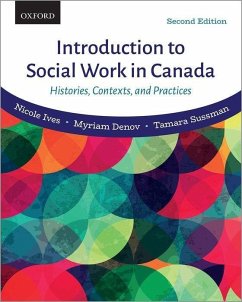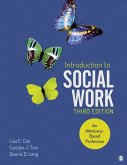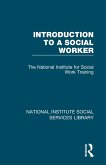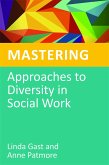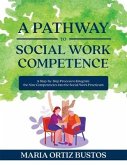Nicole Ives, Myriam Denov, Tamara Sussman
Introduction to Social Work in Canada
Histories, Contexts, and Practices
Nicole Ives, Myriam Denov, Tamara Sussman
Introduction to Social Work in Canada
Histories, Contexts, and Practices
- Broschiertes Buch
- Merkliste
- Auf die Merkliste
- Bewerten Bewerten
- Teilen
- Produkt teilen
- Produkterinnerung
- Produkterinnerung
A well-conceptualized, clearly written, and accessible textbook covering all areas of social work practice that incorporates a social-justice orientation and perspectives from the Indigenous, English, and Francophone context in Canada.
Andere Kunden interessierten sich auch für
![Introduction to Social Work Introduction to Social Work]() Lisa E CoxIntroduction to Social Work178,99 €
Lisa E CoxIntroduction to Social Work178,99 €![Introduction to Social Work Introduction to Social Work]() Rinie SchenkIntroduction to Social Work37,99 €
Rinie SchenkIntroduction to Social Work37,99 €![Social Work and Science in the 21st Century Social Work and Science in the 21st Century]() Leon H GinsbergSocial Work and Science in the 21st Century89,99 €
Leon H GinsbergSocial Work and Science in the 21st Century89,99 €![The Field Placement Survival Guide: What You Need to Know to Get the Most From Your Social Work Practicum (Second Edition) The Field Placement Survival Guide: What You Need to Know to Get the Most From Your Social Work Practicum (Second Edition)]() Linda May GrobmanThe Field Placement Survival Guide: What You Need to Know to Get the Most From Your Social Work Practicum (Second Edition)26,99 €
Linda May GrobmanThe Field Placement Survival Guide: What You Need to Know to Get the Most From Your Social Work Practicum (Second Edition)26,99 €![Introduction to a Social Worker Introduction to a Social Worker]() The National Institute for Social Work TIntroduction to a Social Worker48,99 €
The National Institute for Social Work TIntroduction to a Social Worker48,99 €![Mastering Approaches to Diversity in Social Work Mastering Approaches to Diversity in Social Work]() Linda GastMastering Approaches to Diversity in Social Work41,99 €
Linda GastMastering Approaches to Diversity in Social Work41,99 €![A Pathway to Social Work Competence A Pathway to Social Work Competence]() Maria Ortiz BustosA Pathway to Social Work Competence55,99 €
Maria Ortiz BustosA Pathway to Social Work Competence55,99 €-
-
-
A well-conceptualized, clearly written, and accessible textbook covering all areas of social work practice that incorporates a social-justice orientation and perspectives from the Indigenous, English, and Francophone context in Canada.
Hinweis: Dieser Artikel kann nur an eine deutsche Lieferadresse ausgeliefert werden.
Hinweis: Dieser Artikel kann nur an eine deutsche Lieferadresse ausgeliefert werden.
Produktdetails
- Produktdetails
- Verlag: Hurst & Co.
- 2nd edition
- Seitenzahl: 504
- Erscheinungstermin: 1. Juni 2020
- Englisch
- Abmessung: 251mm x 203mm x 20mm
- Gewicht: 862g
- ISBN-13: 9780199028818
- ISBN-10: 0199028818
- Artikelnr.: 58341437
- Herstellerkennzeichnung
- Libri GmbH
- Europaallee 1
- 36244 Bad Hersfeld
- gpsr@libri.de
- Verlag: Hurst & Co.
- 2nd edition
- Seitenzahl: 504
- Erscheinungstermin: 1. Juni 2020
- Englisch
- Abmessung: 251mm x 203mm x 20mm
- Gewicht: 862g
- ISBN-13: 9780199028818
- ISBN-10: 0199028818
- Artikelnr.: 58341437
- Herstellerkennzeichnung
- Libri GmbH
- Europaallee 1
- 36244 Bad Hersfeld
- gpsr@libri.de
Nicole Ives is an Associate Professor and Director of the Bachelor of Social Work program at McGill Universitys School of Social Work. She is a qualitative researcher with a focus on refugee and immigrant issues and issues of acculturation, exploring the lived experience of policies. Her research has included examining outcomes for refugees that have been sponsored by religious congregations, the effects of US immigration policy on Liberian refugee families, and Bosnian refugee resettlement in the United States and Denmark. Ives teaches Anti-Oppressive Social Work Practice and Qualitative Research Methods, participates on the BSW Program Task Force, and is a member of the First Nations and Inuit Social Work Program Steering Group. She has taught at McGill, the University of Pennsylvania, and Rutgers. Myriam Denov is James McGill Professor, a Trudeau Fellow, and Canada Research Chair in Youth, Gender, and Armed Conflict (Tier 1) at the School of Social Work at McGill University. Her research and teaching interests lie in the areas of child and youth in adversity, and international child protection, with an emphasis on war and political violence, children in armed conflict, and gender-based violence. Denov has authored five books, including for Cambridge University Press and for Palgrave Macmillan. She holds a PhD from the University of Cambridge, where she was a Commonwealth Scholar. Tamara Sussman is an Associate Professor in the School of Social Work, McGill University. Her research focuses on how health services and systems impact older adults and their family members. Her research projects include spousal carers experiences with home care; older adults and family members experiences with the transition into long-term care; barriers and facilitators to the delivery of effective interventions for depressed older adults and their care partners; and most recently the experiences of more marginalized populations of older adults such as older homeless adults and older adults identifying as gay, lesbian, bisexual and transgender (LGBT). In 2011, Dr. Sussman was awarded the H. Noel Fieldhouse Award for Distinguished Teaching in recognition of her teaching excellence.
* Part I: Historical, Theoretical, and Philosophical Frameworks
* Chapter 1: Historical Foundations of Addressing Need: Indigenous,
French, and English Traditions
* Learning Objectives
* Chapter Outline
* Indigenous Helping and Healing Traditions
* French Historical Foundations of Social Work
* English Historical Foundations of Social Work
* Women and Poverty
* Major Social Legislation from the Depression Onwards
* The Development of Social Work as a Profession
* From All Our Histories to Today: A Vision of Contemporary Canadian
Social Work
* Conclusion
* Questions for Critical Thought
* Chapter 2: Social Work Theories
* Learning Objectives
* Chapter Outline
* Theory and Social Work: An Awkward and Unwanted Partnership?
* What Is Theory?
* Can One Theory Do It All?
* Ways of Seeing and Ways of Knowing: Power and Politics in Social Work
Theory
* Theoretical Perspectives
* Conclusion
* Questions for Critical Thought
* Chapter 3: Ethics in Social Work
* Learning Objectives
* Chapter Outline
* Why Are Ethics Important in Social Work?
* A Brief History of Ethics in Social Work
* The Canadian Association of Social Workers Code of Ethics
* Addressing Ethical Dilemmas: The Process of Reflexive Decision-Making
* Ethical Social Work Practice and Self-Care
* Conclusion
* Questions for Critical Thought
* Part II: Foundational Skills for Social Workers
* Chapter 4: Social Work with Individuals and Families
* Learning Objectives
* Chapter Outline
* Historical Contexts of Social Work with Individuals and Families
* Practice with Individuals and Families
* Communication Skills
* Attending
* Questioning
* Reflecting
* Summarizing
* The Social Work Relationship
* Care and Concern
* Genuineness
* Empathy
* Collaboration
* Self-Disclosure: A Contested Issue in Supporting the Development of
Common Factors
* Hope: A Neglected Common Factor
* Official Language Legislation and Social Services in Canada
* Phases of the Helping Process
* Phase I: Exploration/Assessment
* Phase II: Contracting/Planning
* Phase III: Implementation/Intervention
* Phase IV: Ending/Evaluation
* The Helping Process with Families
* The Genogram
* Conclusion
* Questions for Critical Thought
* Chapter 5: Social Work with Groups and Communities
* Learning Objectives
* Chapter Outline
* Historical Contexts of Social Work with Groups and Communities
* Different Forms of Social Work Groups
* Treatment Groups
* Task Groups
* Stages of Group Development
* Group Leadership and Facilitation
* Community Social Work Practice
* Community Practice Frameworks
* Conclusion
* Questions for Critical Thought
* Part III: Fields of Social Work Practice
* Chapter 6: Social Work and Health
* Learning Objectives
* Chapter Outline
* Early Health-Care Provision
* Contemporary Approaches to Health-Care Provision
* Report by the Commission of Inquiry into Health and Welfare (1970)
* Canada Health Act (1984)
* Romanow Report (2002)
* The Privatization of Health Services in Canada
* Social Work Practice in Health Care
* Hospital-Based Social Work
* Social Work and End-of-Life Care
* Social Work and Mental Health Care
* Social Determinants of Health in Canada
* Income
* Early Childhood and Adolescence
* Unemployment and Working Conditions
* Food Insecurity
* Housing
* Indigenous Status
* Racialized Identity
* Disability
* Gender
* Access to Health Services
* Substance Use and Abuse
* Education
* Conclusion
* Questions for Critical Thought
* Chapter 7: Social Work Practice with Children
* Learning Objectives
* Chapter Outline
* Canadas Children: Issues, Facts, and Figures
* Child Poverty
* Family Violence
* Child Maltreatment
* Changing Conceptions of Children in Canada: A History of Child
Welfare
* Stage One: Children as Objects: The Absence of Legal Rights and
Protections
* Stage Two: Children as Vulnerable Individuals in Need of Protection
* Stage Three: Children as Subjects
* The Canadian Human Rights Tribunal on First Nations Child Welfare
* Contemporary Child Welfare Practice
* Youth Justice in Canada
* Children as Objects: The Absence of Legal Protections
* The Vulnerable Child and Parens Patriae: The Introduction of the
Juvenile Delinquents Act
* Children as Subjects? The Clash Between Rights and Accountability
* Youth Crime in Canada
* Recent Reforms: Bill C-25 and Bill C-10
* The Role of Social Workers in Youth Justice
* Preventive Social Work with Children
* Key Challenges in Child Welfare and Youth Justice: Implications for
Social Workers
* Conclusion
* Questions for Critical Thought
* Chapter 8: Indigenous Peoples and Social Work (by Cyndy Baskin and
Alyssa McLeod)
* Learning Objectives
* Chapter Outline
* Who Are Indigenous Peoples?
* Since the Beginning of Time: Indigenous Ways of Helping
* Colonization: The Time of the Great Struggle
* Kill the Indian in the Child
* The Sixties Scoop
* Contemporary Challenges in Indigenous Communities
* Contemporary Challenges in Urban Settings
* Disappeared and Murdered Indigenous Women and Girls
* National Inquiry into Missing and Murdered Indigenous Women and Girls
* Walking with Our Sisters
* Steps toward Healing
* The Medicine Wheel as a Healing Tool
* Indigenous Worldviews in Social Work
* Uniqueness of the Metis
* Social Work Theories as Seen Through an Indigenous Lens
* Challenges Facing Indigenous Social Workers
* Indigenous Focused Social Work Programs
* Being an Ally
* Idle No More
* The Eighth Fire
* Truth and Reconciliation Commission of Canada
* Conclusion
* Questions for Critical Thought
* Chapter 9: Social Work with Immigrants and Refugees
* Learning Objectives
* Chapter Outline
* Overview of the Contemporary Canadian Migration Landscape
* Who Are Todays Migrants?
* The War in Syria
* Migration Policy Overview
* International-Level Policies
* National-Level Policies
* Theoretical Approaches to Working with Migrant Populations
* Ecological Systems Theory
* Strengths and Empowerment Approaches
* Integrating Culture into Practice Approaches
* Stages of Migration Framework
* Settlement Issues Facing Migrants in Canada
* Goals and Expectations
* Employment and Education
* Language
* Health
* Housing
* Social Support
* Settlement Services
* Vulnerable Groups
* Gender and Migration
* Trafficking
* Unaccompanied Minors
* Lesbian, Gay, Bisexual, Transgender, and Queer (LGBTQ) Immigrants and
Refugees
* Refugee and Immigrant Older Adults
* Migrants with Disabilities
* Survivors of Torture
* Conclusion
* Questions for Critical Thought
* Chapter 10: Social Work and Sexual and Gender Diversity (by Edward Ou
Jin Lee and Shari Brotman)
* Learning Objectives
* Chapter Outline
* Taking Up Sexual and Gender Identity Terms
* Overview of the TSLGBTQ Human Rights Global and Canadian Landscape
* Global Context
* Canadian Context
* Violence, Discrimination, and Stigma
* Internalized Homophobia and Transphobia
* Intersectionality as a Theoretical Framework
* Intersectionality, Identity, and Social Location
* Disclosure of Sexual and Gender Identity: Coming Out
* Families and Communities
* Families
* Communities
* Social Work Practice with TSLGBTQ People across Health-Care and
Social Service Settings
* Historical Dimensions
* Social Dimensions
* Access to Health Care for Specific TSLGBTQ Groups
* Access to Social Services for TSLGBTQ People
* Barriers to Access for TSLGBTQ Individuals across Health-Care and
Social Service Settings
* The Continuum of Attitudes toward Sexual and Gender Difference in
Health/Care and Social Services
* Guidelines for Social Workers to Foster Safe and Affirming Space for
TSLGBTQ People
* Social Location and Institutional Power
* Collective Empowerment
* Conclusion
* Questions for Critical Thought
* Chapter 11: Disability and Social Work Practice (by Carl Ernst and
Radha MacCulloch)
* Learning Objectives
* Chapter Outline
* Defining Disability
* What Is Disability? How Is Disability Defined in Canada?
* Theorizing Disability
* The Medical Model of Disability
* The Social Model of Disability
* The World Health Organizations International Classification of
Functioning, Disability, and Health (ICF)
* Categorizing Disability
* The Categorical or Diagnostic Approach
* The Non-categorical or Functional Approach
* Prevalence of Disability in Canada
* History of Disability Policy in Canada
* Early Beliefs about Individuals with Disabilities
* Asylum, Confinement, and Institutionalization
* De-institutionalization
* Progress and Development of Disability Rights in Canada
* Social Work Practice with Individuals with a Disability
* Health and Social Services for Individuals with Disabilities:
Navigating the Systems of Care
* Settings for Social Workers in a Disability Context
* Promoting Inclusion: Roles for Social Workers in a Disability Context
* Social Work Practice Guidelines
* Conclusion
* Questions for Critical Thought
* Chapter 12: Social Work with Aging Populations
* Learning Objectives
* Chapter Outline
* Overview of Canadas Aging Population
* Ethnic and Racial Diversity among Older Adults in Canada
* Aging of Minority French-Speaking Canadians
* Rural Aging
* Mental Health and Aging
* Theorizing Aging
* Micro Theories of Aging
* Macro Theories of Aging
* Policies that Have an Impact on Older Adults
* Retirement Policies and Programs
* Long-Term Care Policies and Programs
* Elder Abuse: A Global Issue
* Elder Abuse in Canada
* Theorizing Elder Abuse
* Social Location and Elder Abuse
* Conclusion
* Questions for Critical Thought
* Chapter 13: International Social Work
* Learning Objectives
* Chapter Outline
* Why International Social Work?
* Social Work beyond Borders: Historical Patterns of Expansion and the
Canadian Connection
* Defining International Social Work: An Ongoing Challenge
* International Social Welfare Organizations and Their Functions
* The United Nations and Its Agencies
* Government Agencies
* International Non-governmental Organizations
* Faith-Based Organizations
* Values and Ethics in International Social Work
* International Social Work Practice: Implications of the Export Model
* Social Work and International Issues: The Global Reality of Child
Soldiers
* Girls and War
* The UN System
* Non-government Organizations
* Canadian Government Agencies
* Canadian NGOs and Agencies
* Conclusion
* Questions for Critical Thought
* Appendix: Code of Ethics, 2005
* Glossary
* References
* Index
* Chapter 1: Historical Foundations of Addressing Need: Indigenous,
French, and English Traditions
* Learning Objectives
* Chapter Outline
* Indigenous Helping and Healing Traditions
* French Historical Foundations of Social Work
* English Historical Foundations of Social Work
* Women and Poverty
* Major Social Legislation from the Depression Onwards
* The Development of Social Work as a Profession
* From All Our Histories to Today: A Vision of Contemporary Canadian
Social Work
* Conclusion
* Questions for Critical Thought
* Chapter 2: Social Work Theories
* Learning Objectives
* Chapter Outline
* Theory and Social Work: An Awkward and Unwanted Partnership?
* What Is Theory?
* Can One Theory Do It All?
* Ways of Seeing and Ways of Knowing: Power and Politics in Social Work
Theory
* Theoretical Perspectives
* Conclusion
* Questions for Critical Thought
* Chapter 3: Ethics in Social Work
* Learning Objectives
* Chapter Outline
* Why Are Ethics Important in Social Work?
* A Brief History of Ethics in Social Work
* The Canadian Association of Social Workers Code of Ethics
* Addressing Ethical Dilemmas: The Process of Reflexive Decision-Making
* Ethical Social Work Practice and Self-Care
* Conclusion
* Questions for Critical Thought
* Part II: Foundational Skills for Social Workers
* Chapter 4: Social Work with Individuals and Families
* Learning Objectives
* Chapter Outline
* Historical Contexts of Social Work with Individuals and Families
* Practice with Individuals and Families
* Communication Skills
* Attending
* Questioning
* Reflecting
* Summarizing
* The Social Work Relationship
* Care and Concern
* Genuineness
* Empathy
* Collaboration
* Self-Disclosure: A Contested Issue in Supporting the Development of
Common Factors
* Hope: A Neglected Common Factor
* Official Language Legislation and Social Services in Canada
* Phases of the Helping Process
* Phase I: Exploration/Assessment
* Phase II: Contracting/Planning
* Phase III: Implementation/Intervention
* Phase IV: Ending/Evaluation
* The Helping Process with Families
* The Genogram
* Conclusion
* Questions for Critical Thought
* Chapter 5: Social Work with Groups and Communities
* Learning Objectives
* Chapter Outline
* Historical Contexts of Social Work with Groups and Communities
* Different Forms of Social Work Groups
* Treatment Groups
* Task Groups
* Stages of Group Development
* Group Leadership and Facilitation
* Community Social Work Practice
* Community Practice Frameworks
* Conclusion
* Questions for Critical Thought
* Part III: Fields of Social Work Practice
* Chapter 6: Social Work and Health
* Learning Objectives
* Chapter Outline
* Early Health-Care Provision
* Contemporary Approaches to Health-Care Provision
* Report by the Commission of Inquiry into Health and Welfare (1970)
* Canada Health Act (1984)
* Romanow Report (2002)
* The Privatization of Health Services in Canada
* Social Work Practice in Health Care
* Hospital-Based Social Work
* Social Work and End-of-Life Care
* Social Work and Mental Health Care
* Social Determinants of Health in Canada
* Income
* Early Childhood and Adolescence
* Unemployment and Working Conditions
* Food Insecurity
* Housing
* Indigenous Status
* Racialized Identity
* Disability
* Gender
* Access to Health Services
* Substance Use and Abuse
* Education
* Conclusion
* Questions for Critical Thought
* Chapter 7: Social Work Practice with Children
* Learning Objectives
* Chapter Outline
* Canadas Children: Issues, Facts, and Figures
* Child Poverty
* Family Violence
* Child Maltreatment
* Changing Conceptions of Children in Canada: A History of Child
Welfare
* Stage One: Children as Objects: The Absence of Legal Rights and
Protections
* Stage Two: Children as Vulnerable Individuals in Need of Protection
* Stage Three: Children as Subjects
* The Canadian Human Rights Tribunal on First Nations Child Welfare
* Contemporary Child Welfare Practice
* Youth Justice in Canada
* Children as Objects: The Absence of Legal Protections
* The Vulnerable Child and Parens Patriae: The Introduction of the
Juvenile Delinquents Act
* Children as Subjects? The Clash Between Rights and Accountability
* Youth Crime in Canada
* Recent Reforms: Bill C-25 and Bill C-10
* The Role of Social Workers in Youth Justice
* Preventive Social Work with Children
* Key Challenges in Child Welfare and Youth Justice: Implications for
Social Workers
* Conclusion
* Questions for Critical Thought
* Chapter 8: Indigenous Peoples and Social Work (by Cyndy Baskin and
Alyssa McLeod)
* Learning Objectives
* Chapter Outline
* Who Are Indigenous Peoples?
* Since the Beginning of Time: Indigenous Ways of Helping
* Colonization: The Time of the Great Struggle
* Kill the Indian in the Child
* The Sixties Scoop
* Contemporary Challenges in Indigenous Communities
* Contemporary Challenges in Urban Settings
* Disappeared and Murdered Indigenous Women and Girls
* National Inquiry into Missing and Murdered Indigenous Women and Girls
* Walking with Our Sisters
* Steps toward Healing
* The Medicine Wheel as a Healing Tool
* Indigenous Worldviews in Social Work
* Uniqueness of the Metis
* Social Work Theories as Seen Through an Indigenous Lens
* Challenges Facing Indigenous Social Workers
* Indigenous Focused Social Work Programs
* Being an Ally
* Idle No More
* The Eighth Fire
* Truth and Reconciliation Commission of Canada
* Conclusion
* Questions for Critical Thought
* Chapter 9: Social Work with Immigrants and Refugees
* Learning Objectives
* Chapter Outline
* Overview of the Contemporary Canadian Migration Landscape
* Who Are Todays Migrants?
* The War in Syria
* Migration Policy Overview
* International-Level Policies
* National-Level Policies
* Theoretical Approaches to Working with Migrant Populations
* Ecological Systems Theory
* Strengths and Empowerment Approaches
* Integrating Culture into Practice Approaches
* Stages of Migration Framework
* Settlement Issues Facing Migrants in Canada
* Goals and Expectations
* Employment and Education
* Language
* Health
* Housing
* Social Support
* Settlement Services
* Vulnerable Groups
* Gender and Migration
* Trafficking
* Unaccompanied Minors
* Lesbian, Gay, Bisexual, Transgender, and Queer (LGBTQ) Immigrants and
Refugees
* Refugee and Immigrant Older Adults
* Migrants with Disabilities
* Survivors of Torture
* Conclusion
* Questions for Critical Thought
* Chapter 10: Social Work and Sexual and Gender Diversity (by Edward Ou
Jin Lee and Shari Brotman)
* Learning Objectives
* Chapter Outline
* Taking Up Sexual and Gender Identity Terms
* Overview of the TSLGBTQ Human Rights Global and Canadian Landscape
* Global Context
* Canadian Context
* Violence, Discrimination, and Stigma
* Internalized Homophobia and Transphobia
* Intersectionality as a Theoretical Framework
* Intersectionality, Identity, and Social Location
* Disclosure of Sexual and Gender Identity: Coming Out
* Families and Communities
* Families
* Communities
* Social Work Practice with TSLGBTQ People across Health-Care and
Social Service Settings
* Historical Dimensions
* Social Dimensions
* Access to Health Care for Specific TSLGBTQ Groups
* Access to Social Services for TSLGBTQ People
* Barriers to Access for TSLGBTQ Individuals across Health-Care and
Social Service Settings
* The Continuum of Attitudes toward Sexual and Gender Difference in
Health/Care and Social Services
* Guidelines for Social Workers to Foster Safe and Affirming Space for
TSLGBTQ People
* Social Location and Institutional Power
* Collective Empowerment
* Conclusion
* Questions for Critical Thought
* Chapter 11: Disability and Social Work Practice (by Carl Ernst and
Radha MacCulloch)
* Learning Objectives
* Chapter Outline
* Defining Disability
* What Is Disability? How Is Disability Defined in Canada?
* Theorizing Disability
* The Medical Model of Disability
* The Social Model of Disability
* The World Health Organizations International Classification of
Functioning, Disability, and Health (ICF)
* Categorizing Disability
* The Categorical or Diagnostic Approach
* The Non-categorical or Functional Approach
* Prevalence of Disability in Canada
* History of Disability Policy in Canada
* Early Beliefs about Individuals with Disabilities
* Asylum, Confinement, and Institutionalization
* De-institutionalization
* Progress and Development of Disability Rights in Canada
* Social Work Practice with Individuals with a Disability
* Health and Social Services for Individuals with Disabilities:
Navigating the Systems of Care
* Settings for Social Workers in a Disability Context
* Promoting Inclusion: Roles for Social Workers in a Disability Context
* Social Work Practice Guidelines
* Conclusion
* Questions for Critical Thought
* Chapter 12: Social Work with Aging Populations
* Learning Objectives
* Chapter Outline
* Overview of Canadas Aging Population
* Ethnic and Racial Diversity among Older Adults in Canada
* Aging of Minority French-Speaking Canadians
* Rural Aging
* Mental Health and Aging
* Theorizing Aging
* Micro Theories of Aging
* Macro Theories of Aging
* Policies that Have an Impact on Older Adults
* Retirement Policies and Programs
* Long-Term Care Policies and Programs
* Elder Abuse: A Global Issue
* Elder Abuse in Canada
* Theorizing Elder Abuse
* Social Location and Elder Abuse
* Conclusion
* Questions for Critical Thought
* Chapter 13: International Social Work
* Learning Objectives
* Chapter Outline
* Why International Social Work?
* Social Work beyond Borders: Historical Patterns of Expansion and the
Canadian Connection
* Defining International Social Work: An Ongoing Challenge
* International Social Welfare Organizations and Their Functions
* The United Nations and Its Agencies
* Government Agencies
* International Non-governmental Organizations
* Faith-Based Organizations
* Values and Ethics in International Social Work
* International Social Work Practice: Implications of the Export Model
* Social Work and International Issues: The Global Reality of Child
Soldiers
* Girls and War
* The UN System
* Non-government Organizations
* Canadian Government Agencies
* Canadian NGOs and Agencies
* Conclusion
* Questions for Critical Thought
* Appendix: Code of Ethics, 2005
* Glossary
* References
* Index
* Part I: Historical, Theoretical, and Philosophical Frameworks
* Chapter 1: Historical Foundations of Addressing Need: Indigenous,
French, and English Traditions
* Learning Objectives
* Chapter Outline
* Indigenous Helping and Healing Traditions
* French Historical Foundations of Social Work
* English Historical Foundations of Social Work
* Women and Poverty
* Major Social Legislation from the Depression Onwards
* The Development of Social Work as a Profession
* From All Our Histories to Today: A Vision of Contemporary Canadian
Social Work
* Conclusion
* Questions for Critical Thought
* Chapter 2: Social Work Theories
* Learning Objectives
* Chapter Outline
* Theory and Social Work: An Awkward and Unwanted Partnership?
* What Is Theory?
* Can One Theory Do It All?
* Ways of Seeing and Ways of Knowing: Power and Politics in Social Work
Theory
* Theoretical Perspectives
* Conclusion
* Questions for Critical Thought
* Chapter 3: Ethics in Social Work
* Learning Objectives
* Chapter Outline
* Why Are Ethics Important in Social Work?
* A Brief History of Ethics in Social Work
* The Canadian Association of Social Workers Code of Ethics
* Addressing Ethical Dilemmas: The Process of Reflexive Decision-Making
* Ethical Social Work Practice and Self-Care
* Conclusion
* Questions for Critical Thought
* Part II: Foundational Skills for Social Workers
* Chapter 4: Social Work with Individuals and Families
* Learning Objectives
* Chapter Outline
* Historical Contexts of Social Work with Individuals and Families
* Practice with Individuals and Families
* Communication Skills
* Attending
* Questioning
* Reflecting
* Summarizing
* The Social Work Relationship
* Care and Concern
* Genuineness
* Empathy
* Collaboration
* Self-Disclosure: A Contested Issue in Supporting the Development of
Common Factors
* Hope: A Neglected Common Factor
* Official Language Legislation and Social Services in Canada
* Phases of the Helping Process
* Phase I: Exploration/Assessment
* Phase II: Contracting/Planning
* Phase III: Implementation/Intervention
* Phase IV: Ending/Evaluation
* The Helping Process with Families
* The Genogram
* Conclusion
* Questions for Critical Thought
* Chapter 5: Social Work with Groups and Communities
* Learning Objectives
* Chapter Outline
* Historical Contexts of Social Work with Groups and Communities
* Different Forms of Social Work Groups
* Treatment Groups
* Task Groups
* Stages of Group Development
* Group Leadership and Facilitation
* Community Social Work Practice
* Community Practice Frameworks
* Conclusion
* Questions for Critical Thought
* Part III: Fields of Social Work Practice
* Chapter 6: Social Work and Health
* Learning Objectives
* Chapter Outline
* Early Health-Care Provision
* Contemporary Approaches to Health-Care Provision
* Report by the Commission of Inquiry into Health and Welfare (1970)
* Canada Health Act (1984)
* Romanow Report (2002)
* The Privatization of Health Services in Canada
* Social Work Practice in Health Care
* Hospital-Based Social Work
* Social Work and End-of-Life Care
* Social Work and Mental Health Care
* Social Determinants of Health in Canada
* Income
* Early Childhood and Adolescence
* Unemployment and Working Conditions
* Food Insecurity
* Housing
* Indigenous Status
* Racialized Identity
* Disability
* Gender
* Access to Health Services
* Substance Use and Abuse
* Education
* Conclusion
* Questions for Critical Thought
* Chapter 7: Social Work Practice with Children
* Learning Objectives
* Chapter Outline
* Canadas Children: Issues, Facts, and Figures
* Child Poverty
* Family Violence
* Child Maltreatment
* Changing Conceptions of Children in Canada: A History of Child
Welfare
* Stage One: Children as Objects: The Absence of Legal Rights and
Protections
* Stage Two: Children as Vulnerable Individuals in Need of Protection
* Stage Three: Children as Subjects
* The Canadian Human Rights Tribunal on First Nations Child Welfare
* Contemporary Child Welfare Practice
* Youth Justice in Canada
* Children as Objects: The Absence of Legal Protections
* The Vulnerable Child and Parens Patriae: The Introduction of the
Juvenile Delinquents Act
* Children as Subjects? The Clash Between Rights and Accountability
* Youth Crime in Canada
* Recent Reforms: Bill C-25 and Bill C-10
* The Role of Social Workers in Youth Justice
* Preventive Social Work with Children
* Key Challenges in Child Welfare and Youth Justice: Implications for
Social Workers
* Conclusion
* Questions for Critical Thought
* Chapter 8: Indigenous Peoples and Social Work (by Cyndy Baskin and
Alyssa McLeod)
* Learning Objectives
* Chapter Outline
* Who Are Indigenous Peoples?
* Since the Beginning of Time: Indigenous Ways of Helping
* Colonization: The Time of the Great Struggle
* Kill the Indian in the Child
* The Sixties Scoop
* Contemporary Challenges in Indigenous Communities
* Contemporary Challenges in Urban Settings
* Disappeared and Murdered Indigenous Women and Girls
* National Inquiry into Missing and Murdered Indigenous Women and Girls
* Walking with Our Sisters
* Steps toward Healing
* The Medicine Wheel as a Healing Tool
* Indigenous Worldviews in Social Work
* Uniqueness of the Metis
* Social Work Theories as Seen Through an Indigenous Lens
* Challenges Facing Indigenous Social Workers
* Indigenous Focused Social Work Programs
* Being an Ally
* Idle No More
* The Eighth Fire
* Truth and Reconciliation Commission of Canada
* Conclusion
* Questions for Critical Thought
* Chapter 9: Social Work with Immigrants and Refugees
* Learning Objectives
* Chapter Outline
* Overview of the Contemporary Canadian Migration Landscape
* Who Are Todays Migrants?
* The War in Syria
* Migration Policy Overview
* International-Level Policies
* National-Level Policies
* Theoretical Approaches to Working with Migrant Populations
* Ecological Systems Theory
* Strengths and Empowerment Approaches
* Integrating Culture into Practice Approaches
* Stages of Migration Framework
* Settlement Issues Facing Migrants in Canada
* Goals and Expectations
* Employment and Education
* Language
* Health
* Housing
* Social Support
* Settlement Services
* Vulnerable Groups
* Gender and Migration
* Trafficking
* Unaccompanied Minors
* Lesbian, Gay, Bisexual, Transgender, and Queer (LGBTQ) Immigrants and
Refugees
* Refugee and Immigrant Older Adults
* Migrants with Disabilities
* Survivors of Torture
* Conclusion
* Questions for Critical Thought
* Chapter 10: Social Work and Sexual and Gender Diversity (by Edward Ou
Jin Lee and Shari Brotman)
* Learning Objectives
* Chapter Outline
* Taking Up Sexual and Gender Identity Terms
* Overview of the TSLGBTQ Human Rights Global and Canadian Landscape
* Global Context
* Canadian Context
* Violence, Discrimination, and Stigma
* Internalized Homophobia and Transphobia
* Intersectionality as a Theoretical Framework
* Intersectionality, Identity, and Social Location
* Disclosure of Sexual and Gender Identity: Coming Out
* Families and Communities
* Families
* Communities
* Social Work Practice with TSLGBTQ People across Health-Care and
Social Service Settings
* Historical Dimensions
* Social Dimensions
* Access to Health Care for Specific TSLGBTQ Groups
* Access to Social Services for TSLGBTQ People
* Barriers to Access for TSLGBTQ Individuals across Health-Care and
Social Service Settings
* The Continuum of Attitudes toward Sexual and Gender Difference in
Health/Care and Social Services
* Guidelines for Social Workers to Foster Safe and Affirming Space for
TSLGBTQ People
* Social Location and Institutional Power
* Collective Empowerment
* Conclusion
* Questions for Critical Thought
* Chapter 11: Disability and Social Work Practice (by Carl Ernst and
Radha MacCulloch)
* Learning Objectives
* Chapter Outline
* Defining Disability
* What Is Disability? How Is Disability Defined in Canada?
* Theorizing Disability
* The Medical Model of Disability
* The Social Model of Disability
* The World Health Organizations International Classification of
Functioning, Disability, and Health (ICF)
* Categorizing Disability
* The Categorical or Diagnostic Approach
* The Non-categorical or Functional Approach
* Prevalence of Disability in Canada
* History of Disability Policy in Canada
* Early Beliefs about Individuals with Disabilities
* Asylum, Confinement, and Institutionalization
* De-institutionalization
* Progress and Development of Disability Rights in Canada
* Social Work Practice with Individuals with a Disability
* Health and Social Services for Individuals with Disabilities:
Navigating the Systems of Care
* Settings for Social Workers in a Disability Context
* Promoting Inclusion: Roles for Social Workers in a Disability Context
* Social Work Practice Guidelines
* Conclusion
* Questions for Critical Thought
* Chapter 12: Social Work with Aging Populations
* Learning Objectives
* Chapter Outline
* Overview of Canadas Aging Population
* Ethnic and Racial Diversity among Older Adults in Canada
* Aging of Minority French-Speaking Canadians
* Rural Aging
* Mental Health and Aging
* Theorizing Aging
* Micro Theories of Aging
* Macro Theories of Aging
* Policies that Have an Impact on Older Adults
* Retirement Policies and Programs
* Long-Term Care Policies and Programs
* Elder Abuse: A Global Issue
* Elder Abuse in Canada
* Theorizing Elder Abuse
* Social Location and Elder Abuse
* Conclusion
* Questions for Critical Thought
* Chapter 13: International Social Work
* Learning Objectives
* Chapter Outline
* Why International Social Work?
* Social Work beyond Borders: Historical Patterns of Expansion and the
Canadian Connection
* Defining International Social Work: An Ongoing Challenge
* International Social Welfare Organizations and Their Functions
* The United Nations and Its Agencies
* Government Agencies
* International Non-governmental Organizations
* Faith-Based Organizations
* Values and Ethics in International Social Work
* International Social Work Practice: Implications of the Export Model
* Social Work and International Issues: The Global Reality of Child
Soldiers
* Girls and War
* The UN System
* Non-government Organizations
* Canadian Government Agencies
* Canadian NGOs and Agencies
* Conclusion
* Questions for Critical Thought
* Appendix: Code of Ethics, 2005
* Glossary
* References
* Index
* Chapter 1: Historical Foundations of Addressing Need: Indigenous,
French, and English Traditions
* Learning Objectives
* Chapter Outline
* Indigenous Helping and Healing Traditions
* French Historical Foundations of Social Work
* English Historical Foundations of Social Work
* Women and Poverty
* Major Social Legislation from the Depression Onwards
* The Development of Social Work as a Profession
* From All Our Histories to Today: A Vision of Contemporary Canadian
Social Work
* Conclusion
* Questions for Critical Thought
* Chapter 2: Social Work Theories
* Learning Objectives
* Chapter Outline
* Theory and Social Work: An Awkward and Unwanted Partnership?
* What Is Theory?
* Can One Theory Do It All?
* Ways of Seeing and Ways of Knowing: Power and Politics in Social Work
Theory
* Theoretical Perspectives
* Conclusion
* Questions for Critical Thought
* Chapter 3: Ethics in Social Work
* Learning Objectives
* Chapter Outline
* Why Are Ethics Important in Social Work?
* A Brief History of Ethics in Social Work
* The Canadian Association of Social Workers Code of Ethics
* Addressing Ethical Dilemmas: The Process of Reflexive Decision-Making
* Ethical Social Work Practice and Self-Care
* Conclusion
* Questions for Critical Thought
* Part II: Foundational Skills for Social Workers
* Chapter 4: Social Work with Individuals and Families
* Learning Objectives
* Chapter Outline
* Historical Contexts of Social Work with Individuals and Families
* Practice with Individuals and Families
* Communication Skills
* Attending
* Questioning
* Reflecting
* Summarizing
* The Social Work Relationship
* Care and Concern
* Genuineness
* Empathy
* Collaboration
* Self-Disclosure: A Contested Issue in Supporting the Development of
Common Factors
* Hope: A Neglected Common Factor
* Official Language Legislation and Social Services in Canada
* Phases of the Helping Process
* Phase I: Exploration/Assessment
* Phase II: Contracting/Planning
* Phase III: Implementation/Intervention
* Phase IV: Ending/Evaluation
* The Helping Process with Families
* The Genogram
* Conclusion
* Questions for Critical Thought
* Chapter 5: Social Work with Groups and Communities
* Learning Objectives
* Chapter Outline
* Historical Contexts of Social Work with Groups and Communities
* Different Forms of Social Work Groups
* Treatment Groups
* Task Groups
* Stages of Group Development
* Group Leadership and Facilitation
* Community Social Work Practice
* Community Practice Frameworks
* Conclusion
* Questions for Critical Thought
* Part III: Fields of Social Work Practice
* Chapter 6: Social Work and Health
* Learning Objectives
* Chapter Outline
* Early Health-Care Provision
* Contemporary Approaches to Health-Care Provision
* Report by the Commission of Inquiry into Health and Welfare (1970)
* Canada Health Act (1984)
* Romanow Report (2002)
* The Privatization of Health Services in Canada
* Social Work Practice in Health Care
* Hospital-Based Social Work
* Social Work and End-of-Life Care
* Social Work and Mental Health Care
* Social Determinants of Health in Canada
* Income
* Early Childhood and Adolescence
* Unemployment and Working Conditions
* Food Insecurity
* Housing
* Indigenous Status
* Racialized Identity
* Disability
* Gender
* Access to Health Services
* Substance Use and Abuse
* Education
* Conclusion
* Questions for Critical Thought
* Chapter 7: Social Work Practice with Children
* Learning Objectives
* Chapter Outline
* Canadas Children: Issues, Facts, and Figures
* Child Poverty
* Family Violence
* Child Maltreatment
* Changing Conceptions of Children in Canada: A History of Child
Welfare
* Stage One: Children as Objects: The Absence of Legal Rights and
Protections
* Stage Two: Children as Vulnerable Individuals in Need of Protection
* Stage Three: Children as Subjects
* The Canadian Human Rights Tribunal on First Nations Child Welfare
* Contemporary Child Welfare Practice
* Youth Justice in Canada
* Children as Objects: The Absence of Legal Protections
* The Vulnerable Child and Parens Patriae: The Introduction of the
Juvenile Delinquents Act
* Children as Subjects? The Clash Between Rights and Accountability
* Youth Crime in Canada
* Recent Reforms: Bill C-25 and Bill C-10
* The Role of Social Workers in Youth Justice
* Preventive Social Work with Children
* Key Challenges in Child Welfare and Youth Justice: Implications for
Social Workers
* Conclusion
* Questions for Critical Thought
* Chapter 8: Indigenous Peoples and Social Work (by Cyndy Baskin and
Alyssa McLeod)
* Learning Objectives
* Chapter Outline
* Who Are Indigenous Peoples?
* Since the Beginning of Time: Indigenous Ways of Helping
* Colonization: The Time of the Great Struggle
* Kill the Indian in the Child
* The Sixties Scoop
* Contemporary Challenges in Indigenous Communities
* Contemporary Challenges in Urban Settings
* Disappeared and Murdered Indigenous Women and Girls
* National Inquiry into Missing and Murdered Indigenous Women and Girls
* Walking with Our Sisters
* Steps toward Healing
* The Medicine Wheel as a Healing Tool
* Indigenous Worldviews in Social Work
* Uniqueness of the Metis
* Social Work Theories as Seen Through an Indigenous Lens
* Challenges Facing Indigenous Social Workers
* Indigenous Focused Social Work Programs
* Being an Ally
* Idle No More
* The Eighth Fire
* Truth and Reconciliation Commission of Canada
* Conclusion
* Questions for Critical Thought
* Chapter 9: Social Work with Immigrants and Refugees
* Learning Objectives
* Chapter Outline
* Overview of the Contemporary Canadian Migration Landscape
* Who Are Todays Migrants?
* The War in Syria
* Migration Policy Overview
* International-Level Policies
* National-Level Policies
* Theoretical Approaches to Working with Migrant Populations
* Ecological Systems Theory
* Strengths and Empowerment Approaches
* Integrating Culture into Practice Approaches
* Stages of Migration Framework
* Settlement Issues Facing Migrants in Canada
* Goals and Expectations
* Employment and Education
* Language
* Health
* Housing
* Social Support
* Settlement Services
* Vulnerable Groups
* Gender and Migration
* Trafficking
* Unaccompanied Minors
* Lesbian, Gay, Bisexual, Transgender, and Queer (LGBTQ) Immigrants and
Refugees
* Refugee and Immigrant Older Adults
* Migrants with Disabilities
* Survivors of Torture
* Conclusion
* Questions for Critical Thought
* Chapter 10: Social Work and Sexual and Gender Diversity (by Edward Ou
Jin Lee and Shari Brotman)
* Learning Objectives
* Chapter Outline
* Taking Up Sexual and Gender Identity Terms
* Overview of the TSLGBTQ Human Rights Global and Canadian Landscape
* Global Context
* Canadian Context
* Violence, Discrimination, and Stigma
* Internalized Homophobia and Transphobia
* Intersectionality as a Theoretical Framework
* Intersectionality, Identity, and Social Location
* Disclosure of Sexual and Gender Identity: Coming Out
* Families and Communities
* Families
* Communities
* Social Work Practice with TSLGBTQ People across Health-Care and
Social Service Settings
* Historical Dimensions
* Social Dimensions
* Access to Health Care for Specific TSLGBTQ Groups
* Access to Social Services for TSLGBTQ People
* Barriers to Access for TSLGBTQ Individuals across Health-Care and
Social Service Settings
* The Continuum of Attitudes toward Sexual and Gender Difference in
Health/Care and Social Services
* Guidelines for Social Workers to Foster Safe and Affirming Space for
TSLGBTQ People
* Social Location and Institutional Power
* Collective Empowerment
* Conclusion
* Questions for Critical Thought
* Chapter 11: Disability and Social Work Practice (by Carl Ernst and
Radha MacCulloch)
* Learning Objectives
* Chapter Outline
* Defining Disability
* What Is Disability? How Is Disability Defined in Canada?
* Theorizing Disability
* The Medical Model of Disability
* The Social Model of Disability
* The World Health Organizations International Classification of
Functioning, Disability, and Health (ICF)
* Categorizing Disability
* The Categorical or Diagnostic Approach
* The Non-categorical or Functional Approach
* Prevalence of Disability in Canada
* History of Disability Policy in Canada
* Early Beliefs about Individuals with Disabilities
* Asylum, Confinement, and Institutionalization
* De-institutionalization
* Progress and Development of Disability Rights in Canada
* Social Work Practice with Individuals with a Disability
* Health and Social Services for Individuals with Disabilities:
Navigating the Systems of Care
* Settings for Social Workers in a Disability Context
* Promoting Inclusion: Roles for Social Workers in a Disability Context
* Social Work Practice Guidelines
* Conclusion
* Questions for Critical Thought
* Chapter 12: Social Work with Aging Populations
* Learning Objectives
* Chapter Outline
* Overview of Canadas Aging Population
* Ethnic and Racial Diversity among Older Adults in Canada
* Aging of Minority French-Speaking Canadians
* Rural Aging
* Mental Health and Aging
* Theorizing Aging
* Micro Theories of Aging
* Macro Theories of Aging
* Policies that Have an Impact on Older Adults
* Retirement Policies and Programs
* Long-Term Care Policies and Programs
* Elder Abuse: A Global Issue
* Elder Abuse in Canada
* Theorizing Elder Abuse
* Social Location and Elder Abuse
* Conclusion
* Questions for Critical Thought
* Chapter 13: International Social Work
* Learning Objectives
* Chapter Outline
* Why International Social Work?
* Social Work beyond Borders: Historical Patterns of Expansion and the
Canadian Connection
* Defining International Social Work: An Ongoing Challenge
* International Social Welfare Organizations and Their Functions
* The United Nations and Its Agencies
* Government Agencies
* International Non-governmental Organizations
* Faith-Based Organizations
* Values and Ethics in International Social Work
* International Social Work Practice: Implications of the Export Model
* Social Work and International Issues: The Global Reality of Child
Soldiers
* Girls and War
* The UN System
* Non-government Organizations
* Canadian Government Agencies
* Canadian NGOs and Agencies
* Conclusion
* Questions for Critical Thought
* Appendix: Code of Ethics, 2005
* Glossary
* References
* Index

